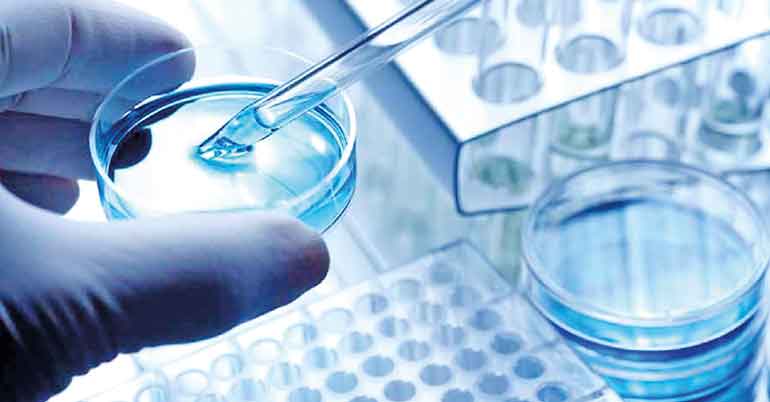Thursday Feb 19, 2026
Thursday Feb 19, 2026
Tuesday, 3 June 2025 01:31 - - {{hitsCtrl.values.hits}}

Bioequivalence testing sounds straightforward, but it’s a complex, resource-intensive process
Sri Lanka’s drive to boost local pharmaceutical manufacturing is running up against a critical bottleneck: the scarcity of bioequivalence testing facilities. For Sri Lankan drug makers trying to prove their generic medicines work as well as the original brands, the journey often leads overseas – adding delays and costs. Industry experts warn that without local capacity for bioequivalence studies, the country’s ambitions to expand its pharma sector and assure medicine quality face an uphill battle. Yet recent developments also hint at opportunities to turn this challenge around.
What is bioequivalence, and why does it matter?
Bioequivalence (BE) studies are how regulators ensure that generic medicine can deliver the same effect as the brand-name version. During a BE study, a group of healthy volunteers are given the generic drug and the original drug separately, and are tested to see if both produce the same levels of the medicine in the bloodstream over time. If the generic releases its active ingredient into the body at the same rate and amount as the original, the two are considered bioequivalent.
Such studies are crucial for generic drugs because they prove the copy is as effective and safe as the innovator. For patients, this means confidence that a more affordable generic will perform the same as the pricier brand. For regulators, BE evidence is key to approving generics and allowing them to substitute for brand-name drugs. Without BE data, a generic drug might not gain approval or acceptance, no matter how well it’s manufactured.
Bioequivalence testing sounds straightforward, but it’s a complex, resource-intensive process, requiring specialised clinical facilities to administer drugs to volunteers, advanced laboratories to measure tiny drug concentrations in blood samples, and stringent ethical and quality controls. Therefore BE studies can be expensive and technically demanding.
Limited local testing options
For years, Sri Lankan pharmaceutical manufacturers had no local facilities to conduct BE studies. As a result, a local company has no way to prove their newly developed generic products matches the efficacy of the original drug.
Since 2014, the National Medicines Regulatory Authority (NMRA) has required bioequivalence data for all generic antibiotics. However, the country’s laboratories were historically limited to basic quality tests, lacking full-fledged BE trial capabilities. This meant companies had rely on foreign laboratories instead, typically in India or elsewhere. That landscape is now beginning to change. General Sir John Kotelawala Defence University (KDU) has recently emerged as a pioneering local BE testing site. In March 2025, Gamma-Interpharm launched Sri Lanka’s first locally proven bioequivalent drug – a diabetes medication – after conducting the entire BE study at KDU.
The drug, a 60mg modified-release gliclazide tablet for diabetes, underwent a successful trial on Sri Lankan volunteers at KDU’s medical faculty, confirming it worked equivalently to the international brand. KDU’s principal investigator for the trial, Prof. Pandula Athauda-Arachchi, has highlighted that the university’s facility is aligned with international standards needed for such studies.
Other Sri Lankan universities are also stepping up. The Faculty of Medicine at the University of Colombo has conducted post-market studies comparing generic antibiotics with originals to explore simpler lab-based alternatives to full BE trials. These academic efforts, while not yet a substitute for formal regulatory studies, show that local expertise is developing.
Despite these efforts, capacity remains limited. Sri Lanka lacks a dedicated, high-throughput bioequivalence testing centre. Conducting the required studies abroad incurs costs in foreign currency, navigating another country’s schedules and regulations, and waiting behind a global queue of other companies. One misstep can delay a product launch by a year or more.
 High costs push studies overseas
High costs push studies overseas
The lack of local options is prohibitively expensive. Bioequivalence studies are not cheap anywhere, but doing them abroad can inflate the bill. Sri Lankan manufacturers must budget for foreign lab fees, travel, shipping, and often repeat tests if foreign regulators require additional data.
In Pakistan, each bioequivalence study can cost up to $ 300,000 – a sum that many companies there (or in Sri Lanka) struggle to afford. This acts as a deterrent for developing new products.
Sri Lanka’s regional neighbours present a mixed picture of cost and accessibility for BE studies:
nIndia: Has a well-established CRO network for bioequivalence, with 90+ accredited BA/BE centres. These utilise a large pool of medical volunteers and have lower operational costs, making studies far cheaper than in Western countries. Sri Lankan firms favour India for its proximity and cost-effectiveness.
nBangladesh has expanded its local bioequivalence testing capabilities. Several pharmaceutical companies have in-house BE study units or collaborate with the country’s research institutions to test their products, conducting many of its needed BE studies domestically at costs competitive with India. Government support – such as subsidised labs or partnerships with universities – has helped improve access to BE testing, giving Bangladeshi generics smoother access into foreign markets.
nPakistan: Pakistan has only 1–2 facilities that can perform bioequivalence trials, a very limited capacity for a country with over 200 drug manufacturers. As a result, Pakistani companies also often outsource studies abroad, incurring high costs. A report on Pakistan’s pharma sector noted that because BE is not routinely mandatory there, investment has been low, leading to steep expenses when they are necessary (for exporting to stricter markets, for example). The absence of affordable local testing has become a barrier to Pakistan’s export ambitions: a cautionary tale for Sri Lanka.
Sri Lanka lacks a dedicated, high-throughput bioequivalence testing centre. Conducting the required studies abroad incurs costs in foreign currency, navigating another country’s schedules and regulations, and waiting behind a global queue of other companies. One misstep can delay a product launch by a year or more
What it takes to build bioequivalence capacity
Closing this gap will require concerted efforts on multiple fronts. Infrastructure is the first hurdle. A bioequivalence centre needs a clinical trial unit where volunteer participants can be safely housed and monitored while they take trial medicines. This includes hospital-grade beds, medical supervision, and emergency care availability. It also needs an analytical laboratory equipped with advanced instruments to detect drug concentrations in small blood samples with extreme accuracy.
Building or upgrading facilities to meet international Good Laboratory Practice (GLP) and Good Clinical Practice (GCP) standards is a significant investment. The government has acknowledged this need, recently announcing plans to develop dedicated drug testing laboratories in Sri Lanka. While initial announcements emphasised quality control labs for routine testing, experts note that integrating BE testing capability – even on a small scale – would be a logical next step so that the country’s lab network can cover both quality and efficacy evaluations.
Technical expertise is equally crucial. Sri Lanka has few experts in BE studies due to limited clinical research opportunities. Conducting a BE study involves clinical pharmacologists, biochemists, lab technicians, and biostatisticians.
Sri Lanka has few experts due to limited opportunities for clinical studies. Expansion would require training or attracting specialists in pharmacokinetics (the science of drug absorption and distribution) and clinical trial management. Solutions could include sending local scientists abroad for training, recruiting Sri Lankan researchers working overseas, or partnering with experienced international CROs. Universities and teaching hospitals could support growth by integrating clinical research training into their programs.
Regulatory and ethical frameworks must also be considered. Any facility conducting BE trials must adhere to strict ethical standards for testing on human volunteers. Sri Lanka has ethics review committees (mostly for academic research), which need to be robustly involved in approving BE study protocols to ensure volunteer safety and informed consent.
The NMRA must also establish clear guidelines for industry-sponsored BE trials to ensure local study results will be accepted as valid evidence in drug registration applications. The good news is that the groundwork is being laid: the NMRA has been moving toward internationally aligned dossier formats and criteria. Researchers have recommended that Sri Lanka adopt the Common Technical Document (CTD) format for drug submissions and expand the list of drugs requiring BE testing. This goes parallel with the need to have local facilities to perform those tests.
Funding and incentives will determine how quickly Sri Lanka can build its BE study capacity. Establishing a world-class bioequivalence centre is expensive and may not be immediately profitable. Government support could come in the form of seed funding, tax breaks for companies that invest in RandD facilities, or public-private partnerships to establish a national BE laboratory.
Local manufacturers feel the pinch – and look to the future
Sri Lankan pharmaceutical manufacturers face delays due to the absence of local BE testing. Regulatory approvals take longer, with drugs developed in months often spending a year or more in testing and paperwork before NMRA authorisation.
If a local company formulates a generic antibiotic pill today, the NMRA would require bioequivalence proof submitted within a two-year provisional registration period. Without local facilities, the company would have to book a study in India, conduct the trial, await the report, and only then submit its registration dossier. Local manufacturers cannot participate in government tenders without NMRA authorisation, leading to imported products being favoured over locally manufactured alternatives. This leads to missed opportunities.
Export ambitions are also at stake. Sri Lanka currently imports far more pharmaceuticals than it exports – about 80% of the market by volume is served by imports. In 2022, Sri Lanka imported around $ 390–496 million worth of medicines, while exporting only about $ 6 million. Local manufacturers aim to position Sri Lanka as a regional producer of quality generic medicines. However, countries with stringent regulations require bioequivalence data. Without local testing capacity, a Sri Lankan generic drug firm may struggle to gather the documentation needed to enter those markets.
The success story of Bangladesh is instructive here: Bangladeshi companies invested early in meeting international quality benchmarks, including BE studies, which has enabled them to export to over 100 countries today. Sri Lankan firms, though smaller in scale, are now looking to follow that path.
Sri Lanka’s pharmaceutical future may well hinge on overcoming this bioequivalence hurdle. The coming years will show whether the country seizes the opportunity to turn an obvious weakness into a homegrown strength – ensuring that “Made in Sri Lanka” medicines are not just affordable, but also rigorously proven to be as good as the best in the world.